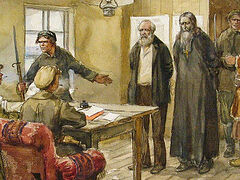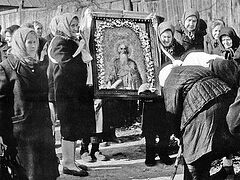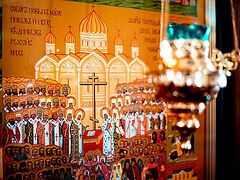In our troubled times, when the ideology of conformism and consumerism is increasingly gaining strength, many people find the meaning and the desire of the first Christians to suffer for witnessing Christ even unto death (cf. Phil. 2:8), incomprehensible and strange. However, even today, martyrdom for Christ’s sake is the building up of the Church of God, the continuation of apostolic service to the world. We have talked about this with Bishop Nestor (Donenko) of Yalta, vicar of the Diocese of Simferopol and the Crimea, author of books and studies on the New Martyrs and Confessors of the Russian Orthodox Church who suffered for their faith between the 1920s and the 1950s.
 Bishop Nestor (Donenko) of Yalta
Bishop Nestor (Donenko) of Yalta
—Vladyka Nestor, you author books about the New Martyrs of Russia. Please tell us when and under what circumstances did this work begin? Why has this particular subject taken a central place in your books? After all, before ordination you were an sculptor. You could have chosen, for instance, the history of Crimean churches or icons, but still you chose the New Martyrs.
—You don’t choose the subject—the subject chooses you. With endless subtle intuitions and invisible connections, you come to what was predetermined for you from the beginning. Of course, the landscape is magnificent, the sea is glorious, the still life is fabulous, but since early childhood man as such has been at the center of my attention. Man is receptacle of that outer cosmos, which is smaller than that of the human soul.
Man is a grandeur that unites the earthly with the heavenly, and at the same time is the center of the world. The Kingdom of God is within you (Lk. 17:21), Christ says. If the Heavenly Kingdom is in you, then, in a sense, you are the center of this world. The only place where you can meet Christ is in the depths of your own heart. This makes man infinitely interesting, voluminous, problematic, dramatic and complex. He comes into contact simultaneously with the higher and the lower worlds, the eternal and the temporal, the earthly and the Heavenly, and it all happens to the same person. This is something that inevitably aroused my interest. Man himself and his life are dramatic if only because, unlike the animals, which are unaware of their ignorance, man knows about his lack of knowledge.
Any story is a life story. And when you come into contact with the “body” of a story, with its reality, you involuntarily begin to move towards greatness, something that is still beyond your comprehension. That’s why the lives of certain people were very interesting to me; and if you imagine the saints and the righteous, then coming into contact with their greatness, you begin to pull your inner self up to overcome the gravity of complacency and vulgarity.
If for example we can speak with other nations on equal terms, it is because we have Tolstoy and Pushkin, and they have Goethe and Schiller... The presence of great poets, writers, scientists, or generals gives us the right to speak on equal terms with representatives of another nation. And even more so the presence of saints, who are higher, greater and of a completely different order from great poets, writers, scientists, philosophers and playwrights. They give us the right to feel our birthright, to savor the spirit and eternity. And, therefore, transparent to the light of Christ, the Divine Light, which imposes a special obligation on us appropriate to legitimate and firstborn children. This is indeed a very interesting challenge that requires our spiritual mobilization. That’s why people, and above all, saints, have always been very interesting to me.
 Parishioners of Sretensky Monastery with portraits of New Martyrs on the anniversary of the great consecration of the Cathedral of the New Martyrs on May 25, 2024
Parishioners of Sretensky Monastery with portraits of New Martyrs on the anniversary of the great consecration of the Cathedral of the New Martyrs on May 25, 2024
—It’s amazing how you manage to have enough time and energy for all these diverse and painstaking labors! After all, your main ministry is being a bishop, and praying. Did you think in your childhood or youth that you would become a bishop?
—Any given person may have some intuition about himself. One day my cousin (he loved to read German books and used to come to the kitchen to share what he had read with his mother) quoted an old German proverb that stuck in my memory: “If you can’t imagine something in your mind, immediately delete it from your plans.” Indeed, it proved to be a guide for me: I immediately began to delete from my plans what I could not imagine. The world became transparent and clear to me. It became obvious that I would be a humanities scholar, and the world of culture would be my own, as opposed to the mathematical, managerial and other worlds.
It helped me identify myself and hear the calls coming from the other realm. Any development, if it is genuine, has the tangy taste of the lack of an alternative. As you develop, you realize that every step is cutting off something else. When you are fifteen, one thing is cut off, and when you are twenty-five or thirty—another is cut off. Clearly, at the age of thirty-five you can’t do what you did at fifteen—that is, over the years the situation becomes more ascetic. If in childhood you can study music, mathematics, painting and dancing simultaneously, then at forty-five you can only do what you are used to doing, and all other occupations will clearly end in failure.
But if we talk about our need to move up Jacob’s ladder, from the bottom up, that’s where the most interesting things begin. Not only does each step narrow your horizon of possibilities, it also lifts you off the ground you were trying to lean on. Every stumbling block in your life becomes a step up. Its purpose changes diametrically. You begin to experience what you stumbled over as a condition that lifts you higher. It takes a lot of effort, but it leads you in the only direction you need. Ideally, to the Throne of God Himself. This is the movement that I have always felt to be advantageous, desirable, often problematic, but without any alternative. You must choose something authentic and turn to it with all your being, with all your inner man, to what God wants from you. And it’s not always comfortable. Actually, everyone should hear the voice of Christ: Come unto Me, all ye that labour and are heavy laden (Mt. 11:28); and, I have chosen you (Jn. 15:16).
—It is on the podvig of the confessors of faith that the Church is built and stands; it is through the blood of the martyrs that it is preserved and grows. Early Christians even sought to suffer for their faith. How can we explain this?
—Perhaps the Holy Hierarch Luke, Archbishop of the Crimea, a confessor and wonderworker, a great saint who is highly venerated both in Russia and abroad, clearly defined this in his autobiography, I Came to Love Suffering. A secular, humanistic person will say, “What is suffering? It is undoubtedly bad, destructive, and unacceptable.” And would probably agree with that. God did not create suffering, and there is nothing good in suffering in itself. But if a great saint, an outstanding surgeon, a holy man says that he came to love suffering, then we should look at the object of such love. What did he love about suffering itself?
 St. Luke, Archbishop of the Crimea
St. Luke, Archbishop of the Crimea
If a person endures something (whatever it may be) for Christ’s sake, the Lord turns evil into good. “Where God wills, the order of nature is overthrown” (from the Great Canon of St. Andrew of Crete). In an incomprehensible way, the sufferings of the saints were transformed, became different in quality, acquired an absolutely different meaning, and served a completely different purpose that was contrary to their nature. Stepping upon the path of suffering, leaning on it and taking off from it, a person ascends higher and higher, because the Lord is looking at him. The gravity of sin, vulgarity and comfort is gradually destroyed, and the person ascends to the height of the spirit. On his own he would not have been able to go beyond what is human, mundane, domestic, and sinless. We are not talking about sins now.
When the time of persecution, sorrows, and illness comes, a person mobilizes and realizes that earthly life is a special space, that it is not a health resort or a sanatorium. There is little point in seeking pleasures and pleasant sensations—that is the greatest illusion. Meanwhile, suffering, illness, death, aging and all kinds of infirmities are an absolutely authentic part of our lives. And when a person accepts suffering and walks towards his fears and pain, he is on the right path. Because behind this pain, suffering, and illness Christ is always standing and waiting, to give the sufferer a crown of glory and praise. Suffering, no matter how great, has its limits. And there is always something beyond its boundaries.
If we look with the eyes of faith, we undoubtedly see the presence of Christ on the right and on the left, in front and behind, above and below, so that a person cannot slide even lower. The Lord humbles Himself before a person. He is not on the sidelines and does not look from the outside with an outsider’s gaze. He is at the center of any event, of suffering and pain of the person himself, his daily thoughts and feelings. He is in the midst of a storm and even a war. He is always at the center…
The apostles, frightened by the storm on the Lake of Gennesaret (the Sea of Galilee), saw Christ walking on the water, and immediately the Apostle Peter, despite the obvious danger, wanted to get down out of the “saving” boat and walk towards Him on the water. “Come to Me if you want,” Christ said (cf. Mt. 14:29), and the apostle walked on the water. Actually, this is the only genuine way out of a desperate situation. It would seem that a minute ago Peter wanted to scream in despair, because death was near, the boat was about to sink. Sometimes hope and the real way out are beyond our understanding, even our imagination, and are found in the space of a miracle of God. A similar miracle occurs to every person who is able to understand that the Lord is at the center of his personal storm and extends him His hand. Where the Lord is, there is peace and His Kingdom, and everything turbulent and destructive disappears.
—To modern people the desire of the first Christians to shed their blood for Christ is not entirely understandable; we perceive it more with our mind than with our soul and heart. Why is that? Can it explained by our lack of faith and love?
—How can we counter the ideology of comfort, consumerism and timeserving? In practice, not in theory. Only by Christian asceticism, in its highest and most authentic sense. By resistance to the spirit of comfort, illusions and demagogic security guarantees that sell so well through modern advertising. No matter how precious earthly life is, it is no more precious than eternity. The heavenly has an absolute advantage over the earthly, the eternal over the transitory, and the Divine over the human. If we do not come to love eternity, then the question is, what do we love? The endless slipping away of our lives? Yes, we can and should love life, but not more than eternity, like everything transitory. To be a Christian is nothing other than accepting the Cross of Christ and all suffering as part of the Cross. It is not power and strength that the Church honors, but its sacrifices—the holy martyrs. And the choice is in our hands.
—We often don’t have the heart to think about martyrdom.
—Any Christian is a martyr to one degree or another. In the world ye shall have tribulation (Jn. 16:33), the Lord says. And if a Christian has no enemies, he is not quite a Christian. Do you have any enemies?
—Probably. I write, and there are people who don’t want to hear about God.
—It can be said that the more subjective you are, the more Christian you are; the more of a personality you are, the more significant and serious are your enemies. If someone has no enemies, he is not yet a human being in the full sense and has not yet become a personality. People are often identified by what kind of friends they have: “Tell me who your friend is, and I’ll tell you who you are.” But it should be put this way: “Tell me who your enemy is, and I’ll tell you who you are.” To have an enemy is a huge gain, especially if you are aware of it and understand it. If a nation or an individual has no enemies, this is a metaphysical failure.
The Holy Hierarch Nikolaj (Velimirovic) of Zica called enemies our “strict friends”, because they help us determine what we are, who we are and where we are going. Their help is unique if we want to see our shortcomings and flaws, because with friends we walk side by side towards the same goal, and, as a rule, out of love they often do not want to trouble us and disturb us with their reproaches. However, our enemy goes face to face and immediately points out all our flaws and defects and speaks harshly, scathingly about them. If we take it reasonably, in the Gospel spirit and soberly, then this is a strict friend.
 St. Nikolaj of Zica —I would like to understand fully who an enemy is, since we’re talking about it. I remember the words by the Holy Hierarch Philaret (Drozdov): “Forgive your personal enemies...”
St. Nikolaj of Zica —I would like to understand fully who an enemy is, since we’re talking about it. I remember the words by the Holy Hierarch Philaret (Drozdov): “Forgive your personal enemies...”
—”Forgive your personal enemies, destroy the enemies of your Fatherland, and abhor the enemies of God,” the holy hierarch said. But we must understand that “enemy” status may vary. There are “everyday” enemies when, for example, two women are arguing at the door of a block of flats. Enemies can also be political; some political bacteria may have flown into someone’s head, and a debate begins. There are also cultural enemies, when people have an ethnic incompatibility. There are also economic enemies, when there is a conflict of interests. All this must be discerned and taken into consideration. And the enemies of God, the heirs of Cain, stand quite apart. In our time they consciously and openly say “No!” to God.
But when you distinguish between these things, many thoughts and feelings fall into place.
—Some modern Christians who prefer comfort even deny the feat of martyrdom as inexpedient. How can such people live in a Church that is built on the blood of martyrs? All of us, both believers and non-believers, sooner or later have to go through trials, tribulations, and hardships. Christian life is by no means endless smooth sailing.
—We can say that everything authentic has a slightly bitter taste. Real life has a bitter taste. It is like an old door—always creaking. Normal human life is always complicated, painful and hard. This is a sign of its authenticity. If you live in continuous euphoria and pleasure, then you are either deluded or you have a latent form of schizophrenia. It’s false, it doesn’t happen this way. And comfort is perhaps the strongest and most dangerous drug in the modern world.
If we take the Lives of the saints, both ancient and modern, we will see that they fled from comfort. They deliberately sought an uncomfortable life—to the point that they chose God-forsaken and even dangerous places in which to struggle. They lived financially worse than they could have—that is, they prioritized continuous movement towards Christ with their mind and heart, with their whole being. And therefore, they had painful, strained relations with this world, because whoever is of this world is loved by this world. More precisely, this world makes use of such people. But those who love Christ are hated by the world—it is an unreconcilable conflict. We rarely talk about it and try not to think about it, but comfort is a highly marketable product, in great demand among our contemporaries.
 Dionysius. The “Descent into Hell” Icon, 1502
Dionysius. The “Descent into Hell” Icon, 1502
Strangely enough, they trust the guarantees of those who sell illusions. In exchange for banknotes, they offer security, success and personal happiness. This is the sale of soap bubbles, fantasies, and very dangerous ones at that. Unfortunately, it is not only a waste of money and time, but also an attempt on one’s immortal soul. In exchange for eternity, a never-ending dead end is offered in the form of comfort and well-being, which has the appearance of a branch of hell.
To be continued…




